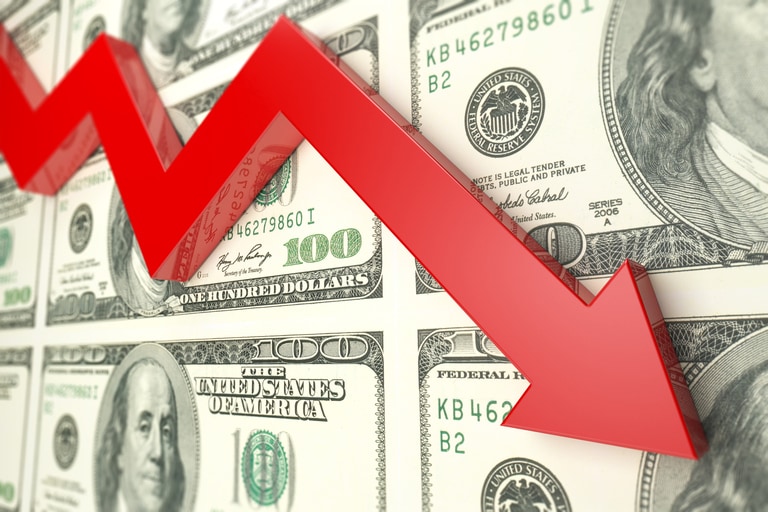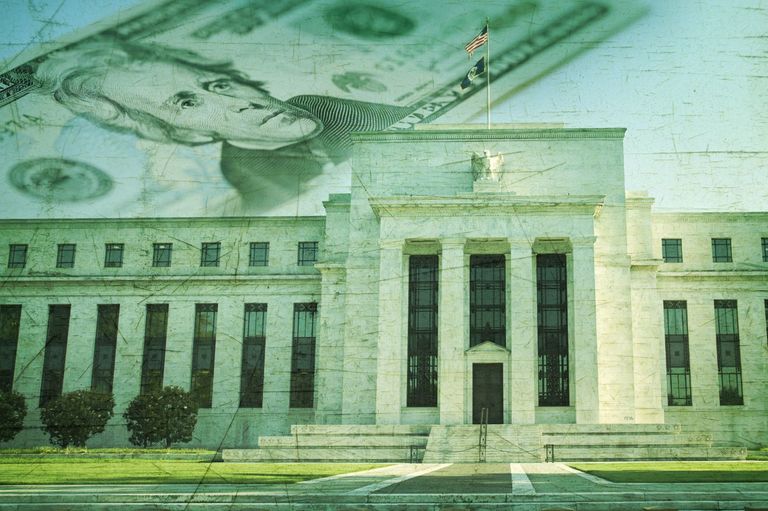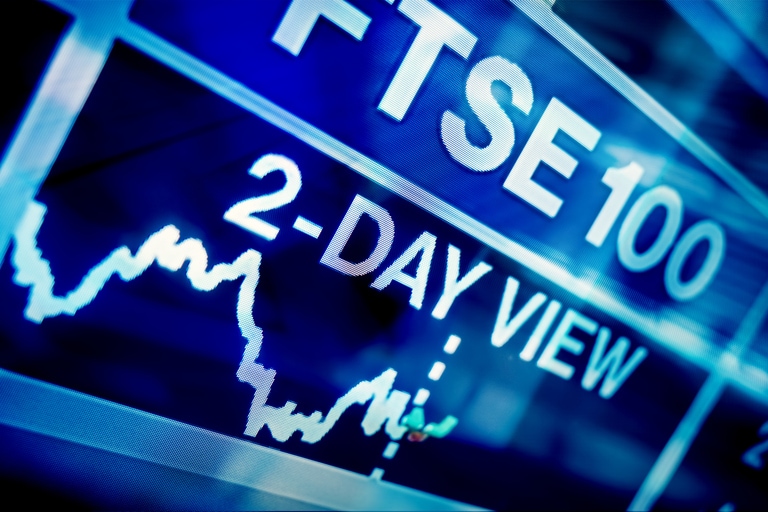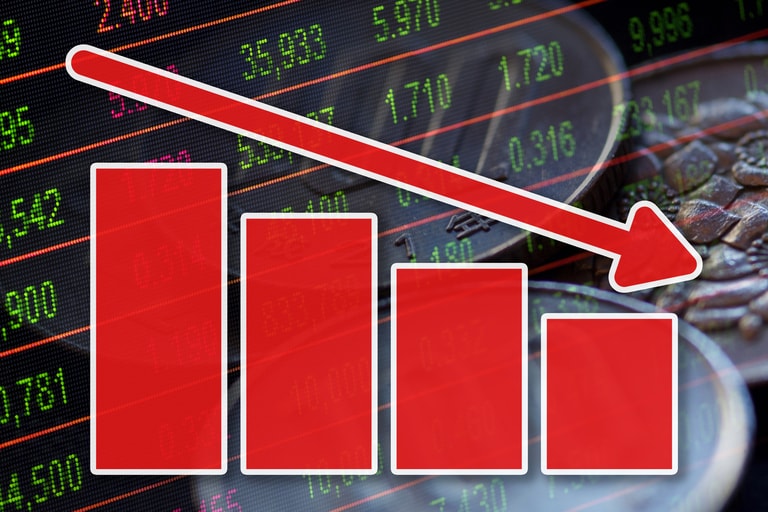The latest US inflation figures come out on Tuesday, a day before the Federal Reserve announces whether it will raise interest rates for the 11th time since March 2022. In a busy week for rate decisions, the European Central Bank is holding its own rate-setting meeting on Thursday, while it’s the Bank of Japan’s turn on Friday. On the earnings front, retailers Kroger and Tesco are set to report their latest results.
Our top three economic and company events in order of importance are:
1. Federal Reserve interest rate decision – Wednesday
On 3 May the Federal Reserve raised interest rates by 25 basis points (bps), lifting the federal funds rate to a new target range of 5% to 5.25%, its highest level for 16 years. The decision brought little in the way of surprises as the Fed signalled that it could soon call a halt to its monetary tightening campaign.
Despite signs of a possible pause, US 2-year Treasury rates have increased over the past month. This is because markets have repriced interest rate cuts, pushing them back from the end of this year to next year, due to resilience in the labour market and core inflation.
Official briefings highlight a divergence of views on how the Fed might move forward, with a slight bias towards keeping rates on hold in June and raising them in July. With the jobs market still strong and wage growth trending above headline CPI, the Fed may have doubts about holding rates this month. But that could be exactly what happens.
2. ECB interest rate decision – Thursday
The European Central Bank seems set to raise its benchmark interest rate by another 25 bps to 3.5% on Thursday. Last month, the ECB increased rates by 25 bps, marking a slowdown from a series of 50 and 75 basis point rate hikes. The recent shift away from aggressive rate rises is partly the result of falling inflation and signs that core price growth may have peaked.
The eurozone’s flash consumer price index (CPI) reading for May showed that headline inflation fell to 6.1%, down from 7% in April and well below December’s 9.2%. The big concern in recent months has been core prices, which grew a record 5.7% in the year to March. However, core price growth eased to 5.3% in May.
We’ve also seen sharp falls in producer prices, which tend to act as a leading indicator of future inflation trends. With Germany’s economy now in recession, the country’s producer price index has slipped into negative territory. The ECB needs to tread carefully on rates given that the threat of deflation is now starting to ripple out across the global economy.
3. Tesco Q1 results – Friday
After Tesco reported solid full-year results in April, shares of the supermarket chain rose to a 12-month high of more than 285p in early May. Since then, they have slipped back roughly 22%
Total revenue last year increased 7.2% to £65.76bn as consumers were forced to pay more for everyday products. That said, it is notable that the increase in Tesco’s revenue was less than the rate of inflation, which was running above 10% for much of the year. Food price inflation was even higher at close to 17%. This mismatch shows the extent to which Tesco absorbed the rising cost of food, other goods and their related costs. That blows a huge hole in the argument of those who claim that British supermarkets are gouging prices.
The increase in costs was also reflected in Tesco’s lower operating profit, which fell over 40% to £1.5bn. Profit before tax fell 50% to £1bn. More recently, Tesco and other supermarkets have announced further cuts in the prices of staples such as milk. Tesco said it was locking in the price of 1,000 everyday products until 5 July amid stiff competition between the leading chains.
For its new fiscal year, Tesco said it was optimistic that it would be able to deliver the same level of adjusted operating profit as last year, despite the ongoing pressure on its margins. The company also pledged to keeping retail free cash flow in the region of £1.4bn to £1.8bn.
One risk facing Tesco and its rivals is the prospect of political interference. If rumours of price caps on essential items were to become official government policy, it would be the latest in a long line of misguided political interventions to try and ease the cost-of-living crisis.
More key events
Our calendar of selected upcoming economic and company announcements:
MONDAY 12 JUNE
No major scheduled events
TUESDAY 13 JUNE
US CPI (May)
One notable trend of recent months has been the speedy decline in headline inflation in the US. Last June, US CPI peaked at 9.1%. By December, it had sunk to 6.5%. In the year to April, consumer prices grew 4.9% as inflation eased to a two-year low, while core price inflation – which excludes food and energy – slowed to 5.5% from last year’s high of 6.6%.
The decrease in the headline rate of inflation has been driven by sharp falls in energy and commodity prices. Food price inflation has remained sticky. Nonetheless, the slowdown in headline inflation has prompted speculation that the Federal Reserve might keep rates on hold this month, having raised rates at every meeting since March last year.
Factory gate prices, or producer price inflation, have been falling, too. Core producer price growth is at 3.2%, having been as high as 9.7% over a year ago.
The CPI reading for May is expected to show another big slowdown in the headline number. Estimates suggest inflation eased to 4.1%, with core prices slowing to 5.3%.
UK unemployment, average earnings (April)
One factor that has tempered the worst effects of the cost-of-living crisis in the UK has been the resilience of the labour market. Unemployment remains close to 40-year lows, although in the three months to March it ticked marginally higher to 3.9%. It fell as low as 3.5% back in August last year.
While unemployment has been edging higher, wages have also climbed. Average earnings excluding bonuses rose 6.7% in the year to March, the fastest pace of growth for more than 30 years outside of the pandemic.
Pay growth has prompted concerns of a wage-price spiral among some economists. While this is a real concern, the main factor driving earnings growth is higher prices and food price inflation, with the latter running at 17.2%. It’s not pay driving up prices, but prices driving up pay. You can hardly blame people for asking for higher pay if they can’t afford to eat, and the failure to spot this inflationary surge early enough lies squarely with the Bank of England.
Economists expect that earnings grew 6.9% year-on-year in April, and that the unemployment rate stayed at 3.9%.
Ashtead Group full-year results
Ashtead Group shares briefly hit 12-month highs earlier this year after the FTSE 100-listed company released its Q3 numbers. Since then the shares have slipped back, but the industrial rental equipment maker is well positioned to take advantage of the US government’s new infrastructure investment programme. Ashtead’s US business, which trades under the name of Sunbelt Rentals, has been the main driver of the group’s outperformance in recent times.
In March the company raised its full-year guidance for rental revenue growth to 23% to 25%, up from 20% to 23% previously. In Q3 revenue rose 23% to $2.42bn, with rental revenue accounting for $2.19bn of the total. Profit before tax rose 29% to $505m, pushing year-to-date profits up to $1.69bn, a rise of 33% versus the year-ago period.
For the full year, annual revenue is expected to rise to $9.6bn, of which roughly $8.46bn is expected to come from rental revenue. Annual profit before tax is expected to be in the region of $2.15bn.
WEDNESDAY 14 JUNE
Federal Reserve interest rate decision
See our top three events, above
THURSDAY 15 JUNE
ECB interest rate decision
See our top three events, above
China retail sales (May)
Personal consumption bounced back somewhat after the authorities relaxed lockdown restrictions in December, but the rebound appears to be running out of steam.
In the first four months of 2023, retail sales increased strongly year-on-year. In the year to April, retail sales grew 18.4%, up from 10.6% in March. It was the biggest gain since March 2021. However, growth still came in lower than forecast. Furthermore, the non-manufacturing purchasing managers’ index (PMI) reading for May was 54.5, down from 56.4 in April and 58.2 in March, suggesting that expansion may be slowing.
The figures also need to be set in context. A year ago, China was under various lockdown restrictions, leading retail sales to contract by 11.1% in April 2022. The bar for growth was therefore set quite low.
Other business data points have also disappointed China watchers. Industrial production expanded 5.6% in the year to April, missing expectations of a 10.9% increase and underscoring the Chinese economy’s continued struggles with low confidence and weak demand. The figures for May are expected to show a 13.9% year-on-year rebound in retail sales and a 3.8% annual expansion in industrial production.
Kroger Q1 results
The Ohio-headquartered supermarket and department store chain Kroger posted record revenue last year. Revenue came in at $148.26bn as same-store sales grew 5.6%. Profits were worth $4.23 a share. A solid Q4 saw same-store sales rise 6.2% on revenue of $34.82bn, while gross margin was 21.8%. The retailer also offered a more positive outlook than its peers, helped by its investment in its digital business and the partnership with Ocado to build customer fulfilment centres.
Kroger is also looking to buy rival grocer Albertsons for $24.6bn, with that deal set to be completed next year. Looking ahead, Kroger said it expects full-year per-share profit to come in at $4.45 to $4.60. Revenue is expected to rise to $152.1bn, with Q1 expected to contribute $45.2bn. Profit in Q1 is expected to come in at $1.42 a share.
Adobe Q2 results
Since Adobe reported its Q1 numbers back in March, the shares have gone from strength to strength. So far this year, shares of the software firm have risen almost 40% to $463. In Q1 revenue came in ahead of forecasts at $4.66bn, a rise of 9% on the previous year, while profit increased to $3.80 a share.
The company’s digital media segment contributed the bulk of the revenue growth last quarter, leading bosses to raise guidance for Q2 and the full year. The company expects Q2 revenue to come in at around $4.76bn, and full-year profit to be between $15.30 and $15.60 a share.
On its stalled deal with Figma, Adobe said it was engaging with regulators on both sides of the Atlantic amid reports that the US Department of Justice could block the deal. The UK’s competition authority is also looking into the acquisition.
FRIDAY 16 JUNE
Bank of Japan interest rate decision
There has been plenty of speculation that the Bank of Japan could row back on its loose monetary policy to combat high inflation. Yet even though core inflation is running at 4.1% – its highest level since the 1980s – there has been little sign that the BoJ is leaning towards tightening measures, making it an outlier among the world’s central banks.
Consequently, the Japanese yen has weakened from levels we saw at the start of the year, when $1 was worth ¥130. Now one dollar buys almost ¥140, way above the ¥135 level that prompted a BoJ intervention towards the end of last year.
When Haruhiko Kuroda stepped down as governor of Japan’s central bank in April, to be replaced by Kazuo Ueda, many observers expected the new governor to signal some adjustments to the current policy of yield curve control and a bank rate of -0.1%. But nothing was forthcoming, apart from a slight tweak to forward guidance that prompted the latest bout of yen weakness.
However, in May Ueda gave the first signal of a possible change in policy. He warned that Japan’s companies could embed inflation in to any economic rebound if they continue to pass rising wages and costs on to consumers in the form of higher prices.
The Bank of Japan’s forecast continues to predict that core inflation will fall below the 2% target by the end of this year. Perhaps Friday could mark the start of a slight shift in the narrative for a central bank that has maintained a loose monetary policy for over 30 years.
Tesco Q1 results
See our top three events, above
INDEX DIVIDEND SCHEDULE
Dividend payments from an index's constituent shares can affect your trading account. View this week's index dividend schedule.
SELECTED COMPANY RESULTS
| MONDAY 12 JUNE | RESULTS |
| Oracle (US) | Q4 |
| Zedge (US) | Q3 |
| TUESDAY 13 JUNE | RESULTS |
| Ashtead Group (UK) | Full-year |
| iomart Group (UK) | Full-year |
| Motorcar Parts of America (US) | Q4 |
| Oxford Instruments (UK) | Full-year |
| WEDNESDAY 14 JUNE | RESULTS |
| Castings (UK) | Full-year |
| Lennar (US) | Q2 |
| Motorpoint Group (UK) | Full-year |
| Safestore Holdings (UK) | Half-year |
| Severfield (UK) | Full-year |
| THURSDAY 15 JUNE | RESULTS |
| Adobe (US) | Q2 |
| GB Group (UK) | Full-year |
| Halfords (UK) | Full-year |
| Halma (UK) | Full-year |
| Jabil (US) | Q3 |
| Kroger (US) | Q1 |
| FRIDAY 16 JUNE | RESULTS |
| Tesco (UK) | Q1 |
Note: While we check all dates carefully to ensure that they are correct at the time of writing, company announcements are subject to change.
Disclaimer: CMC Markets is an execution-only service provider. The material (whether or not it states any opinions) is for general information purposes only, and does not take into account your personal circumstances or objectives. Nothing in this material is (or should be considered to be) financial, investment or other advice on which reliance should be placed. No opinion given in the material constitutes a recommendation by CMC Markets or the author that any particular investment, security, transaction or investment strategy is suitable for any specific person. The material has not been prepared in accordance with legal requirements designed to promote the independence of investment research. Although we are not specifically prevented from dealing before providing this material, we do not seek to take advantage of the material prior to its dissemination.







